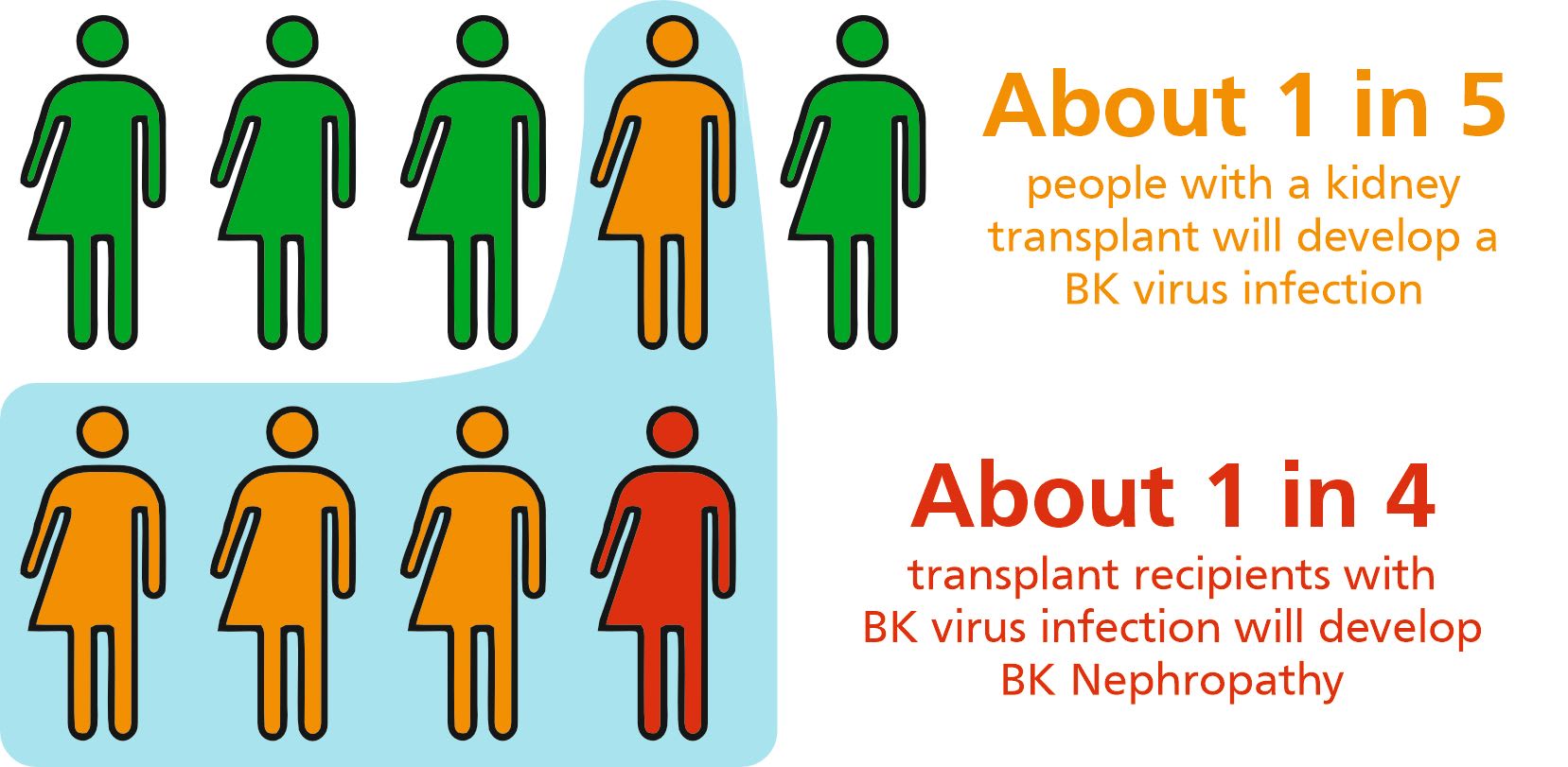If you would like to discuss your kidney diagnosis with our trained members of staff ring the free to call number 0800 169 0936.
The NKF Helpline is available Monday to Thursday 08:30am – 5:00pm Friday 08.30am – 12.30pm on 0800 169 09 36 or email [email protected].
This leaflet explains BK virus infection and why your anti-rejection medication might need to be adjusted to allow the immune system to protect your kidney transplant.
What is BK Virus?
BK virus is an infection almost everyone gets during childhood. The symptoms are like a mild cold, so most people don’t notice when they catch it. After infection, the virus hides in your body for the rest of your life. This is known as a “persistent” infection. During this time, the virus is ‘asleep’ and does not cause any problems.
Why is BK virus relevant now I’ve had a kidney transplant?
BK virus is normally kept under control by your immune system. After your kidney transplant, you take medicines that suppress your immune system to stop it attacking your new kidney. Because of these medicines you are taking, the immune system can’t fight infections so well. This can allow BK virus to ‘wake up’. This usually happens within
the first year after a transplant but can be later on. In most patients where BK virus ‘wakes up’ it will not cause any problems. But it is important to monitor because in some patients it can cause damage to the kidney transplant and urinary tract. When the virus damages the transplant kidney, this is called “BK Nephropathy”.
What are the symptoms of BK infection after a transplant?
Most people will have no symptoms of BK virus infection. Usually it is detected in a routine blood test, and we may do that test if your new kidney starts working less well. Some patients do have symptoms from their BK infection. If you are unsure whether a symptom you are experiencing is due to your BK infection please ask your transplant team.
Why have I got a BK infection?
Nothing you have done has caused it. We don’t know why BK virus wakes up in some people after their transplant and not in others. You haven’t done anything to cause the virus to “wake up”. People who didn’t catch BK virus in childhood might be more at risk.

What can be done about my BK virus infection?
The normal first step is to adjust the anti-rejection medicines you are taking. This allows your immune system to become strong enough to fight off the infection. In some cases, your doctors may suggest different medicines, but there are no medicines that have been proven to work against BK virus. Scientists are working on new treatments. Most people with a BK virus infection will do very well once their immune system starts to attack the virus.
Is it safe to reduce my anti-rejection medicines?
Many people who get BK virus infection worry about reducing their antirejection medicines. However, if the immune system can’t fight BK virus, then it can damage the kidney transplant and eventually cause it to fail. Your doctors will keep a close eye on how your new kidney is working to make sure your medicines are kept at a safe level. You can think of it as fine-tuning the amount of medicine needed to both keep your kidney safe from rejection and allow your body to fight off the infection.
How will I be monitored for BK virus infection?
Nearly all centres use a blood test for BK virus as the first approach diagnose infection.Some centres will do this blood test at regular intervals when you come to clinic for routine appointments after your kidney transplant (this approach is called “screening”). There is currently no standard approach to screening for BK virus across the UK. Some centres will only test for BK virus if your new kidney starts working less well. Some centres may test your urine as well as your blood. Sometimes your doctors may feel you need a biopsy of your transplant kidney to assess whether the infection is doing any damage.
How long does a BK infection last?
BK virus infections can be very variable in how long they can be detected in blood samples. For some people BK virus disappears from their blood in a few weeks but for others it can last more than a year. It is important to remember you are never really cured of the infection but we are aiming to allow the immune system to become strong enough to control the virus.
What should I do now?
The best thing you can do now is to follow your transplant team’s recommendations about changing your anti-rejection medicines. If you are worried about BK virus, you should speak to your transplant team about any concerns you have and how they plan to treat and monitor you.
Further Information
This patient information leaflet was written as part of the British Transplantation Society’s “UK Guideline on Management of BK Polyomavirus (BKPyV) Infection and Disease Following Kidney Transplantation”. Patient engagement was supported by Kidney Research UK. The authors were Simon Baker, Mohammed Al Talib and Matthew Welberry Smith. Last reviewed: 14/06/2024

Download this Information in PDF
The National Kidney Federation cannot accept responsibility for information provided. The above is for guidance only. Patients are advised to seek further information from their own doctor.
- The Renal Warrior Project. Join Now
- Source: https://www.kidney.org.uk/bk-virus
